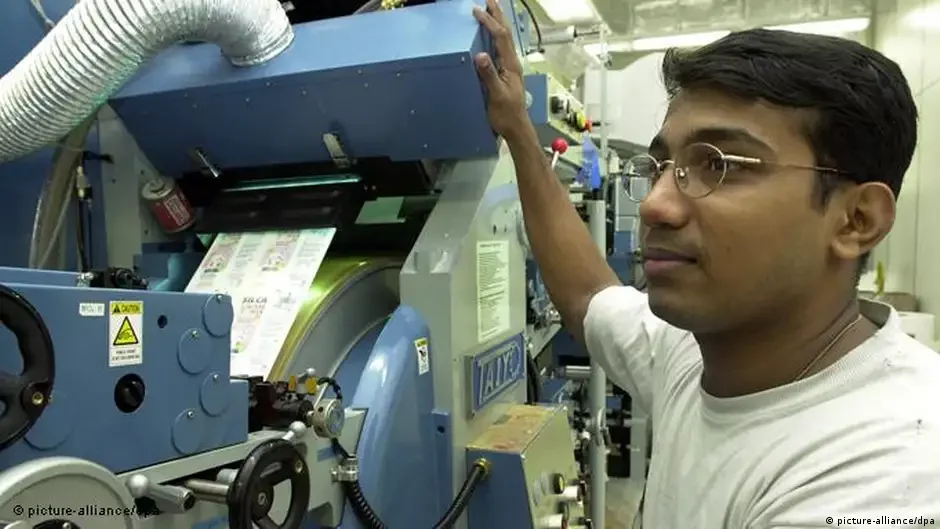Later this year, Germany is set to introduce payment cards loaded with credit for asylum seekers and refugees to use for basic needs.
Several German states are hoping to begin handing out pre-loaded payment cards to asylum seekers and refugees. According to the German press agency dpa, the cards should come into effect from this summer or autumn.
Also read: What's changing in German immigration policy in 2024
Nearly all -- 14 out of 16 -- German states are looking to introduce some form of pre-paid card for asylum seekers and refugees to help cover necessary expenses. Just Bavaria and the northeastern state of Mecklenburg-Vorpommern are introducing alternative schemes. However even regional leaders from these states say they are considering introducing some form of payment card.
Cards should encourage work and integration
"Payment cards should work, based on some pilot projects," claimed a politician from the regional parliament in the German state of Thuringia, according to local newspaper the Reutlinger General Anzeiger.
The unnamed politician went on to say they hadn’t received any complaints about the card from "refugee circles."
They explained that the introduction of the card appeared to inspire some migrants to look for jobs and others to return to their countries of origin, the newspaper reported.
That, commented the Reutlinger General Anzeiger, is what the German state was looking to achieve by introducing the cards.

One of the main ideas behind the payment cards is to ensure that those being supported by the state use the welfare money for what it is intended for -- to do their weekly grocery shop and support their lives here in Germany. The cards cannot be used to send money back home to support extended networks of family.
'Lighten the load of German bureaucracy'
In theory, the payment cards can only be used in certain shops, like supermarkets. If an asylum seeker needs cash for purposes not deemed necessary by the state, they are encouraged to find a job to supplement their income.
Also read: German government mulls limiting migrant remittances
Lower Saxony’s leader Stephan Weil from the socialist SPD party told dpa he thought that introducing the cards would also "lighten the load on German municipal bureaucracy."
Weil said the cards will help encourage asylum seekers to look for work so they can choose what they do with the money they earn themselves.
However, Germany's Catholic news agency KNA highlighted the opinion of social scientist Professor Panu Poutvaara, who believes the effect of the cards needs more research before their introduction.
Effectiveness of cards 'need more research'
Poutvaara is the director of the IFO Center for Migration Research, an economic research institute that seeks to ‘shape the economic debate’ in Germany and Europe, according to its website.
One of the institute's aims is to put information and research into the public sphere through the media to help inform and understand the political and economic decisions being taken.
Also read: This German village is embracing integration
On the IFO website, Poutvaara is quoted saying that "migration can lead to improvements in our standards of living, but only when a society manages to integrate the migrant into the job market."
In a November 2023 press release published by the IFO, Poutvaara worried that asylum seekers could still theoretically use the cards to buy cigarettes or expensive food and try to sell them on at a profit.
"Because of that, I think the cards will only have a minimal effect," stated Poutvaara.

The researcher added that if they were introduced, more research would be needed to see what kind of effect they were actually having.
Poutvaara said that in his opinion, it would be more effective for German administrators to sort asylum seekers into groups of those with a good prospect of staying and those without. Those without a good prospect should be offered less money so that applying for asylum with no real grounds would seem unattractive.
Other solutions offered by researchers at economic institute
Those with a better prospect of actually gaining asylum, said Poutvaara, should be granted asylum more quickly, so they can start working sooner.
The money saved should then be invested in language courses and vocational training so they could quickly integrate into the job market and fill the thousands of vacancies currently plaguing employers in Germany, his colleague Yvonne Giesing said.
Also read: How will the new German citizenship law affect you?
Another helpful strategy, said Giesing, would be to ease the residency restrictions on asylum seekers and refugees, so they can move to find work wherever it is needed, rather than being forced to look in only the area where they are being supported.
Some states have different skill level requirements for certain posts, for example. In the care sector, the German state media has reported on nurses and carers being cleared to work in one state, only to find that they couldn’t take up a post in a different German region without jumping through complicated bureaucratic hurdles, which cost the employer and applicant time and money.
In some cases, reported the German state broadcaster ARD, the qualified nurses were forced to work for less pay and with less responsibility until they could be registered as nurses in the new state.
Giesing added that those receiving support for accommodation or welfare should only be allowed to move if the costs were not more of a burden on the German state than they had been in their previous registered area.
With dpa and KNA
